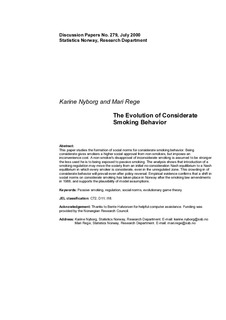The Evolution of considerate smoking behavior
Working paper

Åpne
Permanent lenke
http://hdl.handle.net/11250/180105Utgivelsesdato
2000Metadata
Vis full innførselSamlinger
- Discussion Papers [1003]
Sammendrag
This paper studies the formation of social norms for considerate smoking behavior. Being considerate gives smokers a higher social approval from non-smokers, but imposes an inconvenience cost. A non-smoker's disapproval of inconsiderate smoking is assumed to be stronger the less used he is to being exposed to passive smoking. The analysis shows that introduction of a smoking regulation may move the society from an initial no-consideration Nash equilibrium to a Nash equilibrium in which every smoker is considerate, even in the unregulated zone. This crowding in of considerate behavior will prevail even after policy reversal. Empirical evidence confirms that a shift in social norms on considerate smoking has taken place in Norway after the smoking law amendments in 1988, and supports the plausibility of model assumptions.